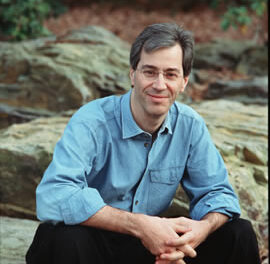It is an invincible human inclination to celebrate achievement at round intervals; five, ten, twenty-five, fifty years, etc. Among performing artists a couple of phenomenal achievers come to mind: while James Levine and Placido Domingo have a few years on him, our own Rodney Wynkoop is clearly of the same mettle, and this season he is celebrating twenty-five years as Director of the Choral Society of Durham and its Chamber Choir. In addition he is founder and Director of Vocal Arts Ensemble of Durham, a standard against which any choir, anywhere in the world could measure its quality. He is also Professor of the Practice of Music at Duke University and Director of Duke Chapel Music, conducting the Duke Chapel Choir and its Chamber Choir. His duties at Duke also include teaching choral conducting and conducting the Duke Chorale, its Chamber Choir and the Schola Cantorum.
The number of things Wynkoop does is impressive, but the true measure of the man is in the quality of his investment in all he does and the quality achievement he inspires in all. As an example, this concert featuring Carl Orff’s Carmina Burana was chosen by Wynkoop as a 25th anniversary occasion because it provided an opportunity to showcase a broad spectrum of Durham talent. The Choral Society of Durham was joined by the Durham Symphony Orchestra, the Durham Children’s Choir, choirs from the Durham School of the Arts and Riverside High School, pianists David Heid and Jane Lynch, and soloists Louise Toppin (UNC-CH), James McKinney and John Daniecki.
Carmina Burana never fails to provide an evening of scintillating rhythms, enchanting tunes, humorous, lovely, and heroic music packaged in Orff’s unique style that is like nothing else. The opening (and closing) chorus, “O Fortuna” is surely as well-known as the four note theme of Beethoven’s Fifth or the “Hallelujah Chorus” from Handel’s Messiah. Though the words speak of the vagaries of fortune, the music is heroic in nature and with a full symphony orchestra involved with all the other forces, it was a powerful and triumphant sound.
The following two choruses, “Fortune plalngo vulnera” (I bemoan the wounds of Fortune) and “Veris leta lacies” (The glad face of spring), get more into the irreverent and bawdy flavor of the cantata. Orff’s bouncy and driving rhythms and primitive sounding melodies and accompaniment project the text of the late medieval poetry. “Omnia sol temperat,” in praise of the faithfulness of the sun and of lovers, introduced the audience to the rich, warm tones of McKinney, singing for the first time with the CSD. Here was a musical find to treasure. Each segment he sang was filled with excitement, rousing vigor and the full range of the baritone tessitura. Toppin worked her familiar magic with the soprano segments, mostly grouped toward the end and all laden with melting romantic tension and finally fulfillment. “Olim lacus colueram” (The roasted swan sings) was done with dramatic, feigned drunkenness superbly by Daniecki. It is a role he has performed over 160 times as reported by information in the program.
The chorus of combined choirs produced a powerful sound when called for, but was light and playful as well where that was needed. The Durham Children’s choir, trained by Scott Hill, was outstanding, singing effectively and confidently all their assignments from memory. The orchestra showed the sparkle and professionalism they have developed under the leadership of William Henry Curry.
All in all it was a memorable and pleasant evening that went by all too fast. No doubt about it, the star of the evening was the maestro whose twenty-five years of superlative leadership was being celebrated on this occasion. There are so many highlights to recall, including Britten’s War Requiem, Verdi’s Requiem, Bach’s B minor Mass, Mozart’s Mass in C minor, Bruckner’s Mass in E minor, Janácek’s Glagolitic Mass. Haydn’s Mass in Time of War, Vaughan Williams’ Dona Nobis Pacem and the recent phenomenal performance of Berlioz’s Requiem, to name just a few that were special to me personally.
The community is richer; thousands who have heard these performances have experienced music that is always vibrant and true under Wynkoop’s hand. Hundreds of singers in the Choral Society and many other groups that have joined with them have carried away knowledge from the inside of the music that evokes lasting joy and brightens many a gray day.
As we celebrate Maestro Wynkoop, he celebrates Durham. May this happy liaison continue with anticipation well into the future.












